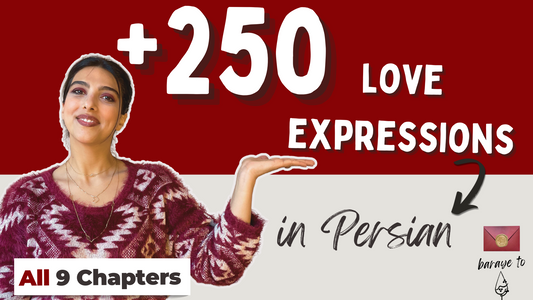Yesterday, during my Persian class with one of my students_ native English Speaker, she wanted to say:
“Last week I was busy because of my work.”
She used barāye (برای). It sounded natural but wasn’t quite accurate here. In English, “for” can sometimes mean both “for the purpose of” and “because of”—but Persian draws a clearer line. So teh question is;
❓Which one is more accurate equivalent for her sentnce in Persian❓
/hafteye pish barāye kār saram shulugh bud./
هفتهی پیش برای کار سرم شلوغ بود.
or
/hafteye pish be khāter-e kār saram shulugh bud./
هفتهی پیش بهخاطر کار سرم شلوغ بود.
Let's see.
You'll read:
1) “Barāye” (برای) — for the purpose of / intended goal
Barāye generally expresses purpose, intention, or goal—something directed toward the future.
✅ Examples:
➕ من برای کار به لندن آمدم.
man barāye kār be landan āmadam.
➝ I came to London for work (purpose).
➕ کمی نشستیم برای اینکه استراحت کنیم.
kami neshastim barāye in-ke esterāhat konim.
➝ We sat for a little while in order to rest.
✍🏽Tip: If you can add “in order to” in English, it’s probably barāye in Persian.
2) “Be khāter-e” (به خاطرِ) — because of / due to / out of
Be khāter-e expresses cause, motivation, or reason—often referring to a past or existing situation, not an intended future action.
✅ Examples:
➕ به خاطرِ کارم سرم شلوغ بود.
be khāter-e kāram saram sholūgh bud.
➝ I was busy because of my work.
➕ نرفتم، برای اینکه هوا سرد بود.
na-raftam, barāye in-ke havā sard bud.
➝ I didn’t go, because it was cold. (Here barāye in-ke functions like “because”.)
3) Overlap & rules of thumb
- barāye in-ke can also mean because in some contexts.
- be khāter-e can in colloquial Persian show both cause and (less commonly) intention.
📏Rule of thumb:
If it’s a goal you intend to do → barāye برای✅
If it’s the reason why something happened → be khāter-e بهخاطرِ✅
4) Songs that help
🎶Shervin Hajipour — “Barāye” (برای)🎶
When this song came out, some translated barāye as “because of” and others as “for.” I prefer “for” in English—here’s why:
Why “for” fits best (a simple, practical argument)
➕ Grammar & directionality: Barāye is the default word for purpose/aim—it points forward, toward a goal or a stand. That’s exactly how the lyrics list “for my sister, for freedom, for dancing…”—they are reasons to act and things we stand for, not post-hoc explanations of a past event.
➕ Test in English: Try adding “in order to”—if it still makes sense, you’re in the territory of purpose. The song lines pass this feel test far better with “for.”
➕ Consistency with Persian usage: In contemporary Persian, barāye most prototypically marks intended purpose (future-facing), while “because of” readings are secondary/contextual.
P.S. I’ve written out the full lyrics with line-by-line meanings in a separate weblog post—read it here
🎶Mansour — “Faghat Be Khāter-e To” (فقط به خاطر تو)🎶
Here’s a couplet that shows clear cause language—so the best English is “because of you”:
دلم کسی رو نمیخواد فقط به خاطرِ تو
delam kasi ro nemikhād, faghat be khāter-e to
My heart doesn’t want anyone—because of you.
غرورِ من رفته به باد فقط به خاطرِ تو
ghorūr-e man rafte be bād, faghat be khāter-e to
My pride has been blown away—because of you.
👀The speaker states results that have already happened; the phrase be khāter-e marks the reason, not an intended goal. That’s why “because of you” is the precise choice here.
5) Practical classroom tip
In my classes, I have students write one real-life sentence each day. When they talk about their own lives—“I was tired because of exams,” “I went to the park for a picnic”—they begin to feel the difference (purpose vs. cause) rather than memorizing it.
Exercises (A/B) — Test Yourself
Choose the best option (A or B). Transliterations are provided under each sentence.
- I came to London ____ work.
A) barāye B) be khāter-e
man ____ kār be Landan āmadam. - I was busy ____ my job last week.
A) barāye B) be khāter-e
hafte-ye gozashte ____ kāram saram sholūgh bud. - We sat for a little while ____ rest.
A) barāye in-ke B) be khāter-e in-ke
kami neshastim ____ esterāhat konim. - I didn’t go ____ it was cold.
A) barāye in-ke B) barāye
na-raftam ____ havā sard bud. - She bought flowers ____ her mother (as a kind gesture/purpose).
A) barāye B) be khāter-e
ū ____ mādarash gol kharid. - The match was canceled ____ the rain.
A) barāye B) be khāter-e
mosābeqe ____ bārān laghv shod. - I’m studying hard ____ pass the exam.
A) barāye in-ke B) be khāter-e
dāram shadid dars mikhānam ____ azmon rā ghabul shavam. - He’s famous ____ his voice (cause/attribution).
A) barāye B) be khāter-e
ū be ____ sedāyash ma’rūf ast. - They met ____ discuss the project (purpose—future-facing).
A) barāye in-ke B) be khāter-e in-ke
ānhā ____ dar bāre-ye porozhe sohbat konand didār kardand . - My heart doesn’t want anyone— ____ you. (Mansour lyric logic = cause)
A) barāye B) be khāter-e
delam kasi ro nemikhād ____ to.
Answer Key
- A) barāye — purpose (“for work”).
- B) be khāter-e — cause (“because of my job”).
- A) barāye in-ke — purpose (“in order to rest”).
- A) barāye in-ke — here it functions as “because.”
- A) barāye — intended gesture/purpose for the mother.
- B) be khāter-e — cause (due to rain).
- A) barāye in-ke — purpose (goal to pass the exam).
- B) be khāter-e — cause/attribution (“because of his voice”).
- A) barāye in-ke — purpose (to discuss).
- B) be khāter-e — cause (fits the Mansour lyric sense).
Sources
Persian: A Comprehensive Grammar (Routledge, 2018) — sections on purpose vs. cause and conjunctions:
- Purpose constructions with barāye in-ke, tā, ke:
- “barāye in-ke” used as “because” (causal):
- Notes on be khāter-e spanning purpose/cause in usage:




